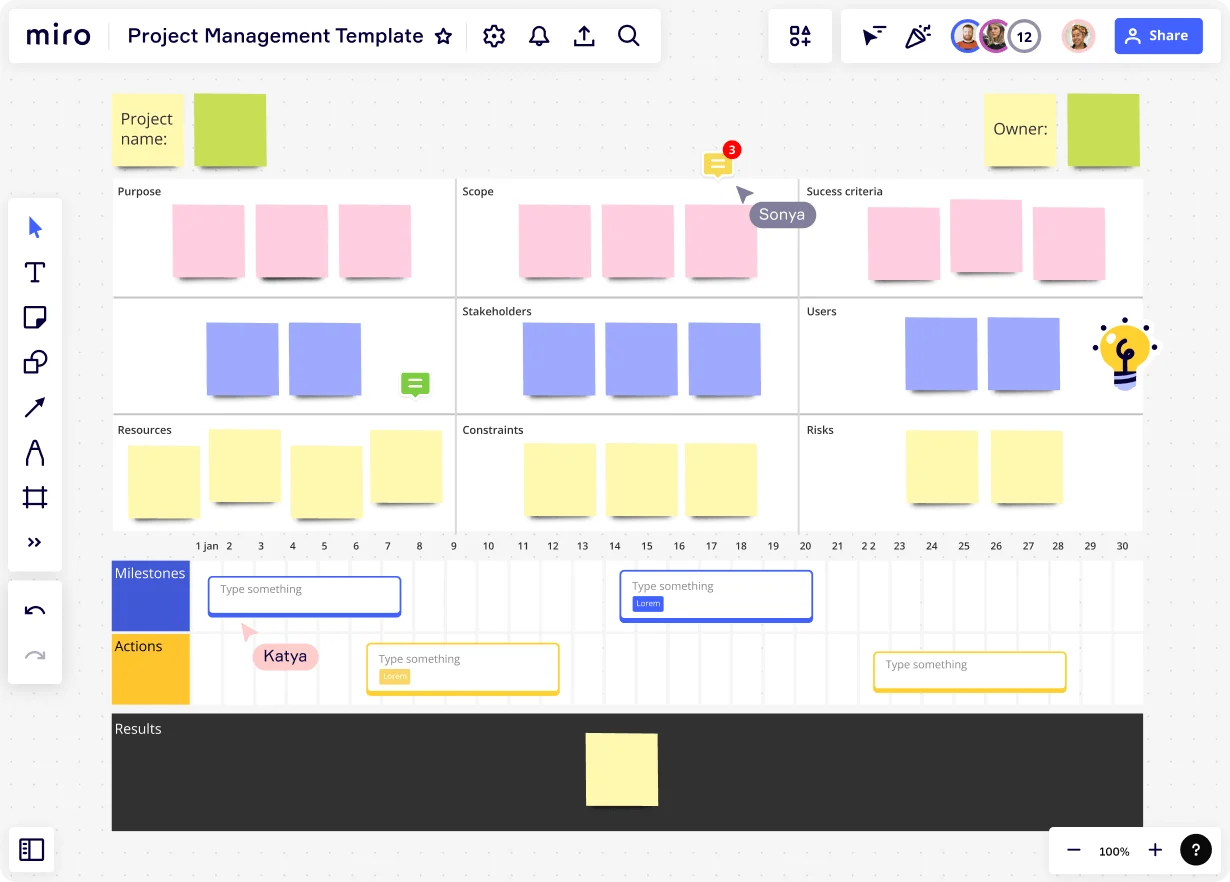
What are the key components of project initiation?

Summary
In this guide, you will learn:
What project initiation is and its foundational role in successful project management
Key objectives and deliverables, including defining scope, goals, and stakeholder involvement
How to clearly outline project scope, set measurable goals, and engage stakeholders
The importance of gathering requirements, analyzing risks, and budgeting during initiation
The role and creation of a project charter to formalize objectives
How to use Miro’s templates and tools for project initiation activities
Try Miro now
Join thousands of teams using Miro to do their best work yet.
Definition of project initiation
Starting with a well-executed project initiation sets the groundwork for a successful and impactful project. Project initiation is the first and most crucial stage in project management.
It involves setting the project's goals, understanding what needs to be done, identifying the people who will be involved, and stakeholders who will need to give their input and be updated on the progress. Project managers use this stage to create a clear plan, create a roadmap, and make sure everyone is on the same page, getting the buy -in from stakeholders.
By focusing on project initiation, project managers lay a strong foundation for a successful project delivery.
Key objectives and deliverables of the project initiation stage
During project initiation, your main goals, as a project manager, are to define the project's purpose, set clear and measurable objectives, and identify the key people involved.
At this stage, you will need to gather all requirements from all stakeholders, run analysis and research, and identify potential risks and constraints. All this information will help you define the project's scope and requirements, budget the project and allocate resources efficiently.
Defining project scope, goals, and objectives in a few easy steps
Start by clearly outlining the project scope, specifying what will be included and excluded from the project.
Engage stakeholders and gather their input to ensure alignment and a shared understanding of the project's direction.
Define specific and measurable project goals that align with the overall business objectives, ensuring a clear sense of purpose.
Break down the goals into actionable and achievable objectives, setting measurable milestones to track progress effectively.
Establish the communication channels and timelines for providing updates on the progress.
Regularly review and refine the project scope, goals, and objectives as needed to adapt to changing requirements and maintain project focus.
Key considerations for project managers in project initiation
Conducting feasibility studies and risk assessments
Before diving into a project, conduct thorough feasibility studies to assess its viability and potential challenges. Identify potential risks and uncertainties, allowing you to develop effective risk mitigation strategies to safeguard the project's success.
Defining project constraints, budgets, and timelines
Clearly outline the project's constraints, including budget limitations and time constraints. Establishing realistic timelines and budgets ensures that resources are efficiently allocated, enabling you to manage expectations and maintain project progress.
Establishing clear roles, responsibilities, and reporting structures
Clearly define roles and responsibilities for each team member, fostering accountability and avoiding confusion during project execution. Establishing a transparent reporting structure ensures seamless communication and efficient decision-making throughout the project lifecycle. A RACI chart template is a great way to clearly visualize everyone's role and ensure transparent communication throughout the project.
Gaining stakeholder buy-in and managing expectations
Engage stakeholders early in the process to gain their buy-in and support for the project's objectives. By managing their expectations and involving them in key decisions, you build a collaborative relationship and ensure alignment with project goals.
Conclusion
As project managers, it's crucial to focus on the beginning of the project. The project initiation phase is vital because it helps you ensure that your project will bring real value before diving into the planning stage. It provides a structured approach to showcase your project's business case and demonstrate its feasibility.
Author: Miro Team
Last update: October 16, 2025